- Home
- Jodi Picoult
Nineteen Minutes Page 12
Nineteen Minutes Read online
Page 12
Peter squinted, looking into the barrel the right way. It was blinding, silver, shiny. Perfect.
His father rubbed down the outside of the barrel with oil. "Now, pull the trigger."
Peter stared at him. Even he knew you didn't do that.
"It's safe," his father repeated. "It's what we need to do to reassemble the gun."
Peter hesitantly curled his finger around the half-moon of metal and pulled. It released a catch so that the bolt his father was holding slid into place.
He watched his father take the rifle back to the gun cabinet. "People who get upset about guns don't know them," his father said. "If you know them, you can handle them safely."
Peter watched his father lock up the gun case. He understood what his father was trying to say: The mystery of the rifle--the very thing that had sparked him to steal the key to the cabinet from his father's underwear drawer and show Josie--was no longer quite as compelling. Now that he'd seen it taken apart and put back together, he saw the firearm for what it was: a collection of fitted metal, the sum of its parts.
A gun was nothing, really, without a person behind it.
Whether or not you believe in Fate comes down to one thing: who you blame when something goes wrong. Do you think it's your fault--that if you'd tried better, or worked harder, it wouldn't have happened? Or do you just chalk it up to circumstance?
I know people who'll hear about the people who died, and will say it was God's will. I know people who'll say it was bad luck. And then there's my personal favorite: They were just in the wrong place at the wrong time.
Then again, you could say the same thing about me, couldn't you?
The Day After
For Peter's sixth Christmas, he'd been given a fish. It was one of those Japanese fighting fish, a beta with a shredded tissue-thin tail that trailed like the gown of a movie star. Peter named it Wolverine and spent hours staring at its moonbeam scales, its sequin eye. But after a few days, he started to imagine what it would be like to have only a bowl to explore. He wondered if the fish hovered over the tendril of plastic plant each time it passed because there was something new and amazing he'd discovered about its shape and size, or because it was a way to count another lap.
Peter started waking up in the middle of the night to see if his fish ever slept, but no matter what time it was, Wolverine was swimming. He thought about what the fish saw: a magnified eyeball, rising like a sun through the thick glass bowl. He'd listen to Pastor Ron at church, talking about God seeing everything, and he wondered if that was what he was to Wolverine.
As he sat in a cell at the Grafton County jail, Peter tried to remember what had happened to his fish. It died, he supposed. He'd probably watched it to death.
He stared up at the camera in the corner of the cell, which blinked at him impassively. They--whoever they were--wanted to make sure he didn't kill himself before he was publicly crucified. To this end, his cell didn't have a cot or a pillow or even a mat--just a hard bench, and that stupid camera.
Then again, maybe this was a good thing. As far as he could tell, he was alone in this little pod of single cells. He'd been terrified when the sheriff's car pulled up in front of the jail. He'd watched all the TV shows; he knew what happened in places like this. The whole time he was being processed, Peter had kept his mouth shut--not because he was so tough, but because he was afraid that if he opened it he would start to cry, and not remember how to stop.
There was the swordfight sound of metal being drawn across metal, and then footsteps. Peter stayed where he was, his hands locked between his knees, his shoulders hunched. He didn't want to look too eager; he didn't want to look pathetic. Invisibility, actually, was something he was pretty good at. He'd perfected it over the past twelve years.
A correctional officer stopped in front of his cell. "You've got a visitor," he said, and he opened the door.
Peter got up slowly. He looked up at the camera, and then followed the officer down a pitted gray hallway.
How hard would it be to get out of this jail? What if, like in all the video games, he could do some fancy kung fu move and deck this guard, and another, and another, until he was able to race out the door and suck in the air whose taste he'd already started to forget?
What if he had to stay here forever?
That was when he remembered what had happened to his fish. In a sweeping moment of animal rights and humanity, Peter had taken Wolverine and flushed him down the toilet. He figured that the plumbing emptied out into some big ocean, like the one his family had gone to last summer on a beach vacation, and that maybe Wolverine could find his way back to Japan and his other beta relatives. It was after Peter confided in his brother that Joey told him about sewers, and that instead of giving his pet freedom, Peter had killed it.
The officer stopped in front of a room whose door read PRIVATE CONFERENCE. He couldn't imagine who would visit him, except for his parents, and he didn't want to see them yet. They would ask him questions he couldn't answer--about how you could tuck a son into bed, and not recognize him the next morning. Maybe it would be easier to just go back to the camera in his cell, which stared but didn't pass judgment.
"Here you go," the officer said, and he opened the door.
Peter took a shuddering breath. He wondered what his fish had thought, expecting the cool blue of the sea, only to wind up swimming in shit.
*
Jordan walked into the Grafton County Jail and stopped at the checkin point. He had to sign in before he went to visit Peter Houghton and get a visitor's badge from the correctional officer on the other side of the Plexiglas divider. Jordan reached for the clipboard and scrawled his name, then pushed it through the tiny slot at the bottom of the plastic wall--but there was no one there to receive it. The two COs inside were huddled around a small black-and-white TV that was tuned, like every other television on the planet, to a news report about the shooting.
"Excuse me," Jordan said, but neither man turned.
"When the shooting began," the reporter was saying, "Ed McCabe peered out the door of his ninth-grade math classroom, putting himself between the gunman and his students."
The screen cut to a sobbing woman, identified in white block letters below her face as JOAN MCCABE, SISTER OF VICTIM. "He cared about his kids," she wept. "He cared about them the whole seven years he'd taught at Sterling, and he cared about them during the last minute of his life."
Jordan shifted his weight. "Hello?"
"Just a second, buddy," one correctional officer said, waving an absent hand in his direction.
The reporter appeared again on the grainy screen, his hair blowing upward like a boat's sail in the light wind, the monotone brick of the school a wall behind him. "Fellow teachers remember Ed McCabe as a committed teacher who was always willing to go the extra mile to help a student, and as an avid outdoorsman who talked often in the faculty room about his dreams to hike through Alaska. A dream," the reporter said gravely, "that will never come to pass."
Jordan took the clipboard and shoved it through the slot in the Plexiglas, so that it clattered on the floor. Both correctional officers turned at once.
"I'm here to see my client," he said.
*
Lewis Houghton had never missed a lecture in the nineteen years he'd been a professor at Sterling College, until today. When Lacy had called he'd left in such a hurry that he hadn't even thought to put a sign on the lecture hall's door. He imagined students waiting for him to appear, waiting to take notes on the very words that came out of his mouth, as if the things he had to say were still beyond reproach.
What word, what platitude, what comment of his had led Peter to this?
What word, what platitude, what comment might have stopped him?
He and Lacy were sitting in their backyard, waiting for the police to leave the house. Well, they had left--or at least one of them--to broaden the search warrant, most likely. Lewis and Lacy had not been allowed into their own home for the duration of t
he search. For a while, they'd stood in the driveway, occasionally watching officers carry out bags and boxes full of things Lewis would have expected--computers, books from Peter's room--and things he hadn't--a tennis racket, a jumbo box of waterproof matches.
"What do we do?" Lacy murmured.
He shook his head, numb. For one of his journal articles on the value of happiness, he'd interviewed elderly folks who were suicidal. What's left for us? they'd said, and at the time, Lewis had not been able to understand that utter lack of hope. At the time, he couldn't imagine the world going so sour that you couldn't see the way to set it to rights.
"There's nothing we can do," Lewis replied, and he meant it. He watched an officer walk out holding a stack of Peter's old comic books.
When he'd first come home to find Lacy pacing the driveway, she'd flung herself into his arms. "Why," she had sobbed. "Why?"
There were a thousand questions in that one, but Lewis couldn't answer any of them. He'd held on to his wife as if she were driftwood in the middle of this flood, and then he had noticed the eyes of a neighbor across the street, peeking from a drawn curtain.
That's when they had moved to the backyard. They sat on the porch swing, surrounded by a thicket of bare branches and melting snow. Lewis sat perfectly still, his fingers and lips numb from cold, from shock.
"Do you think," Lacy whispered, "it's our fault?"
He stared at her, amazed at her bravery: she'd put into words what he hadn't allowed himself to even think. But what else was left to say between them? The shootings had happened; their son was involved. You couldn't argue the facts; you could only change the lens through which you looked at them.
Lewis bent his head. "I don't know." Where did you even begin to look at those statistics? Had it happened because Lacy had picked Peter up too much as a baby? Or because Lewis had pretended to laugh when Peter took a tumble, hoping that the toddler wouldn't cry if he didn't think there was anything to cry about? Should they have monitored more closely what he read, watched, listened to . . . or would smothering him have led to the same outcome? Or maybe it was the combination of Lacy and Lewis together. If a couple's children counted as a track record, then they had failed miserably.
Twice.
Lacy stared down at the intricate brickwork between her shoes. Lewis remembered laying this patio; he'd leveled the sand and set the brick himself. Peter had wanted to help, but Lewis hadn't let him. The bricks were too heavy. You could get hurt, he'd said.
If Lewis had been less protective--if Peter had felt true pain, might he have been less likely to inflict it?
"What was the name of Hitler's mother?" Lacy asked.
Lewis blinked at her. "What?"
"Was she awful?"
He put his arm around Lacy. "Don't do this to yourself," he murmured.
She buried her face in his shoulder. "Everyone else will."
For just a moment, Lewis let himself believe that everyone was mistaken--that Peter couldn't have been the shooter today. In a way, this was true--although there had been hundreds of witnesses, the boy they'd seen was not the same one Lewis had talked to last night before he went to bed. They'd had a conversation about Peter's car.
You know you have to get it inspected by the end of the month, Lewis had said.
Yeah, Peter had replied. I already made an appointment.
Had he been lying about that, too?
"The lawyer--"
"He said he'll call us," Lewis answered.
"Did you tell him Peter's allergic to shellfish? If they feed him any--"
"I told him," Lewis said, although he hadn't. He pictured Peter, sitting alone in a cell at a jail he'd driven by every summer, en route to the Haverhill Fairgrounds. He thought of Peter, calling home on the second night of sleepaway camp, begging to be picked up. He thought of his son, who was still his son, even if he had done something so horrible that Lewis could not close his eyes without imagining the worst; and then his ribs felt too tight and he couldn't draw in enough air.
"Lewis?" Lacy said, pulling away as he gasped. "Are you all right?"
He nodded, smiled, but he was choking on the truth.
"Mr. Houghton?"
They both glanced up to find a police officer standing in front of them.
"Sir, could you come with me for a second?"
Lacy stood up beside him, but he held her off with one hand. He didn't know where this cop was taking him, what he was about to be shown. He didn't want Lacy to see it if she didn't have to.
He followed the policeman into his own house, arrested for a moment by the white-gloved officers combing through his kitchen, his closet. As soon as they reached the basement door, he started to sweat. He knew where they were headed; it was something he had studiously avoided thinking about since he'd first gotten Lacy's call.
Another officer was standing in the basement, blocking Lewis's view. It was ten degrees colder down here, and yet Lewis was sweating. He mopped his forehead with his sleeve. "These rifles," the officer said. "They belong to you?"
Lewis swallowed. "Yes. I hunt."
"Can you tell us, Mr. Houghton, if all your firearms are here?" The officer stepped aside to reveal the glass-fronted gun cabinet.
Lewis felt his knees buckle. Three of his five hunting rifles were nestled inside the gun cabinet, like wallflowers at a dance. Two were missing.
Until this moment, he had not allowed himself to believe this horrible thing about Peter. Until this moment, it had been a devastating accident.
Now, Lewis started blaming himself.
He faced the officer, looking the man in the eye without giving any of his feelings away. An expression, Lewis realized, he'd learned from his own son. "No," he said. "They're not."
*
The first unwritten rule of defense law was to act like you knew everything, when in fact you knew absolutely nothing at all. You were facing an unknown client who may or may not have had a chance in hell of acquittal; the trick, however, was to remain simultaneously impassive and impressive. You had to immediately set the parameters of the relationship: I am boss; you tell me only what I need to hear.
Jordan had been in this situation a hundred times before--waiting, in a private conference room at this very jail, for his next meal ticket to arrive--and he truly believed he had seen it all, which is why he was stunned to find that Peter Houghton had the ability to surprise him. Given the magnitude of the shooting and the damage wrought, the terror on the faces Jordan had seen on the television screen--well, this skinny, freckled, four-eyed kid hardly seemed capable of such an act.
This was his first thought. His second was: That'll work to my advantage.
"Peter," he said. "I'm Jordan McAfee, and I'm a lawyer. I've been retained by your parents to represent you."
He waited for a response. "Have a seat," he said, but the boy remained standing. "Or don't," Jordan added. He put on his business mask and looked up at Peter. "You'll be arraigned tomorrow. You're not going to get bail. We'll have a chance to go over the charges in the morning, before you go into court." He gave Peter a moment to digest this information. "From here on in, you're not going through this alone. You've got me."
Was it Jordan's imagination, or had something flashed in Peter's eyes when he'd said those words? As quickly as it might have happened, it was gone; Peter stared down at the ground, expressionless.
"Well," Jordan said, getting to his feet. "Any questions?"
As he expected, there wasn't any response. Hell, for all of Peter's involvement in this little discussion, Jordan might as well have been chatting up one of the less fortunate victims of the shooting.
Maybe you are, he thought, and the voice in his head sounded too damn much like his wife's.
"All right, then. I'll see you tomorrow." He knocked on the door, summoning the correctional officer who would take Peter back to his cell, when suddenly the boy spoke.
"How many did I get?"
Jordan hesitated, his hand on the knob. He did
not turn to face his client. "I'll see you tomorrow," he repeated.
*
Dr. Ervin Peabody lived across the river in Norwich, Vermont, and worked part-time at Sterling College's psychology program. Six years ago he had been one of seven coauthors of a published paper about school violence--an academic exercise he barely remembered. And yet, he'd been called by the NBC affiliate out of Burlington--a morning news show he sometimes watched over a bowl of cereal for the sheer glee of seeing how often the inept newscasters screwed up. We're looking for someone who can talk about the shooting from a psychological standpoint, the producer had said, and Ervin had replied, I'm your man.
"Warning signals," he said in response to the anchor's question. "Well, these young men pull away from others. They tend to be loners. They talk about hurting themselves, or others. They can't function in school, or are subjected to discipline there. They lack a connection with someone--anyone--who might make them feel important."
Ervin knew the network hadn't come to him for his expertise--only for solace. The rest of Sterling--the rest of the world--wanted to know that kids like Peter Houghton were recognizable, as if the potential to turn into a murderer overnight were a visible birthmark. "So there's a general profile of a school shooter," the anchor prodded.
Ervin Peabody looked into the camera. He knew the truth--that if you said these kids wore black or listened to odd music or were angry, you were discussing most of the male teenage population at some point during their adolescent years. He knew that if a deeply disturbed individual was intent on doing damage, he'd probably succeed. But he also knew that every eye in the Connecticut Valley was on him--maybe even in the whole Northeast--and that he was up for tenure at Sterling. A little prestige--a label of expert--couldn't hurt. "You could make that argument," he said.
*
Lewis was the one who settled the Houghton household for the night. He'd start in the kitchen and load the dishwasher. He'd lock the front door and turn off the lights. Then he'd head upstairs, where Lacy was usually already in bed, reading--if not out assisting at a birth--and he'd stop in his son's room. Tell him to shut off the computer and go to bed.

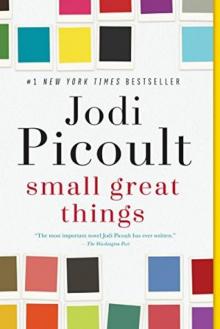 Small Great Things
Small Great Things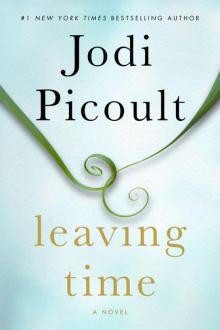 Leaving Time
Leaving Time Nineteen Minutes
Nineteen Minutes Larger Than Life
Larger Than Life Perfect Match
Perfect Match My Sister's Keeper
My Sister's Keeper The Pact
The Pact Handle With Care
Handle With Care Songs of the Humpback Whale
Songs of the Humpback Whale Mermaid
Mermaid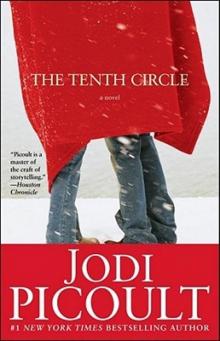 The Tenth Circle
The Tenth Circle The Color War
The Color War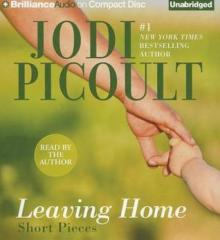 Leaving Home: Short Pieces
Leaving Home: Short Pieces House Rules
House Rules Lone Wolf
Lone Wolf The Storyteller
The Storyteller The Book of Two Ways
The Book of Two Ways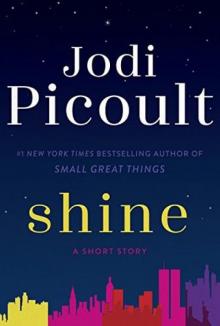 Shine
Shine Off the Page
Off the Page Sing You Home
Sing You Home Second Glance: A Novel
Second Glance: A Novel Mercy
Mercy Vanishing Acts
Vanishing Acts Between the Lines
Between the Lines Plain Truth
Plain Truth Salem Falls
Salem Falls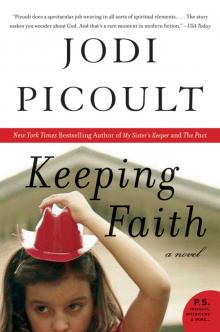 Keeping Faith
Keeping Faith Harvesting the Heart
Harvesting the Heart Change of Heart
Change of Heart Where There's Smoke
Where There's Smoke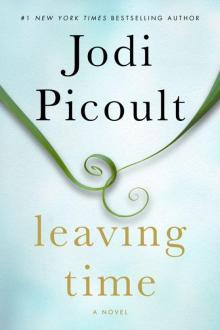 Leaving Time: A Novel
Leaving Time: A Novel Over the Moon
Over the Moon House Rules: A Novel
House Rules: A Novel The Jodi Picoult Collection #2
The Jodi Picoult Collection #2 Leaving Home: Short Pieces (Kindle Single)
Leaving Home: Short Pieces (Kindle Single) My Sister's Keeper: A Novel
My Sister's Keeper: A Novel![Mermaid [Kindle in Motion] (Kindle Single) Read online](http://i1.bookreadfree.com/i1/04/03/mermaid_kindle_in_motion_kindle_single_preview.jpg) Mermaid [Kindle in Motion] (Kindle Single)
Mermaid [Kindle in Motion] (Kindle Single) The Jodi Picoult Collection #4
The Jodi Picoult Collection #4 Sing You Home: A Novel
Sing You Home: A Novel The Jodi Picoult Collection
The Jodi Picoult Collection Lone Wolf A Novel
Lone Wolf A Novel Second Glance
Second Glance Larger Than Life (Novella)
Larger Than Life (Novella) The Jodi Picoult Collection #3
The Jodi Picoult Collection #3